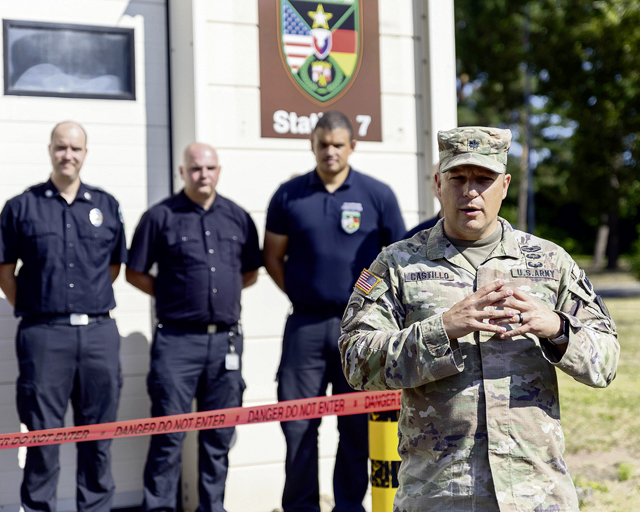
Every year, National Hispanic Heritage Month is observed in the United States from Sep. 15 – Oct. 15, to honor the contributions of Hispanic Americans and celebrate the rich history and culture of Hispanic communities.
Established in 1968 by President Lyndon B. Johnson as National Hispanic Heritage Week, it was expanded to a month-long celebration by President Ronald Reagan in 1988. The start date, Sep. 15, aligns with the independence days of several Latin American countries, including Costa Rica, El Salvador, Guatemala, Honduras, Nicaragua, and Mexico.
During National Hispanic Heritage Month, we not only celebrate the rich culture and heritage of Hispanic Americans but also recognize their significant contributions to the U.S. military. As of 2020, over 160,000 Hispanic Americans serve in the active-duty military, representing a sizable portion of the total active-duty force.
Among these dedicated service members is Lt. Col. David Castillo, who joined the U.S. Army right after high school in 1999. For the past two years, Castillo has served as the director of Emergency Services and garrison provost marshal at U.S. Army Garrison Rheinland-Pfalz.
“This is my first time on an assignment in Europe, and I absolutely love it here,” he said. “I love this garrison, this community and my team of emergency service professionals.
Castillo attributes his “martial spirit” and passion for military history as the driving forces behind his decision to join the U.S. Army. He grew up playing sports that emphasized discipline, teamwork, leadership, and self-sacrifice, and was inspired by his father’s military service and family members who served in World War II, including a great uncle who was tragically killed during the Bataan Death March.
“I looked up to several great men in my family who served in the military,” Castillo said. “Growing up in a military community right outside of Camp Pendleton in California, I was immersed in a ’military culture’ that further fueled my interest in serving.”
Castillo said he realizes that many people are not aware of the long history of Hispanics in the United States, which predates the immigration of many European Americans.
“Most people think of Hispanic Americans as being a product of immigration — ’Johnny come lately’ situation — but in reality, Hispanics in the Southwest and West Coast became Americans in the mid-19th century before many European Americans immigrated to the United States,” he said. “I think Hispanic Heritage Month speaks to the great diversity of our Nation and highlights how many Hispanic Americans have played such a pivotal, but less understood role, in our success as a country.”
He talked about the role that Hispanic Americans have played in the military for centuries, highlighting the unique and positive cultural influence that Hispanic heritage has had on the institution.
“As someone of mixed ancestry, with Hispanic heritage on my father’s side and Scotch-American heritage on my mother’s side, I truly value the diverse cultural influences that contribute to the strength of our military,” he said.
According to Castillo, shared cultural experiences and upbringing cultivate a stronger sense of solidarity and unity.
“A shared sense of identity and connection is crucial in the military, where individuals from diverse backgrounds unite for a common purpose,” he said. “These bonds strengthen teamwork and cohesion, ultimately contributing to the success of the mission.”
Born in California and having spent time growing up in New Mexico, Castillo now considers North Carolina his home due to his wife being from there and two of their children being born and raised there. Even though his family doesn’t typically celebrate National Hispanic Heritage Month, they recognize that Hispanic heritage plays a part in their cultural makeup and identity, he said.
“We do observe Hispanic traditions whether that is through food or the celebration of Dia de Los Muertos (Day of the Dead),” he added. “Even those who are not of Hispanic descent can participate and appreciate the richness of Hispanic heritage, as demonstrated by my wife, who has become an excellent cook of Mexican and New Mexican food and helps us build and decorate an ofrenda in our home to remember and pray for our deceased family members.”
Castillo said he has achieved a lot of things he’s proud of in his military career, including multiple deployments, leading Soldiers, and serving in distinguished units such as the 101st Airborne Division, the 82nd Airborne Division, and the 25th Infantry Division.
“It has been such an honor to serve as a Soldier, and I hope I can continue to serve once my military career is complete.”
Castillo encourages the Hispanic community to embrace their heritage with pride and respect.
“Your origins, family, and culture are a valuable part of who you are and have played a significant role in shaping the American story,” he said. “However, it is equally important to recognize and appreciate the experiences and cultural backgrounds of others. By doing so, we can build a more inclusive and understanding society that celebrates the richness of our diverse heritage.”


